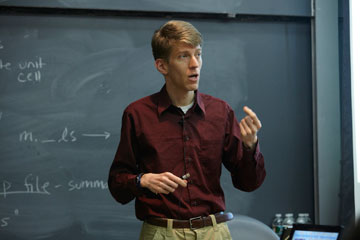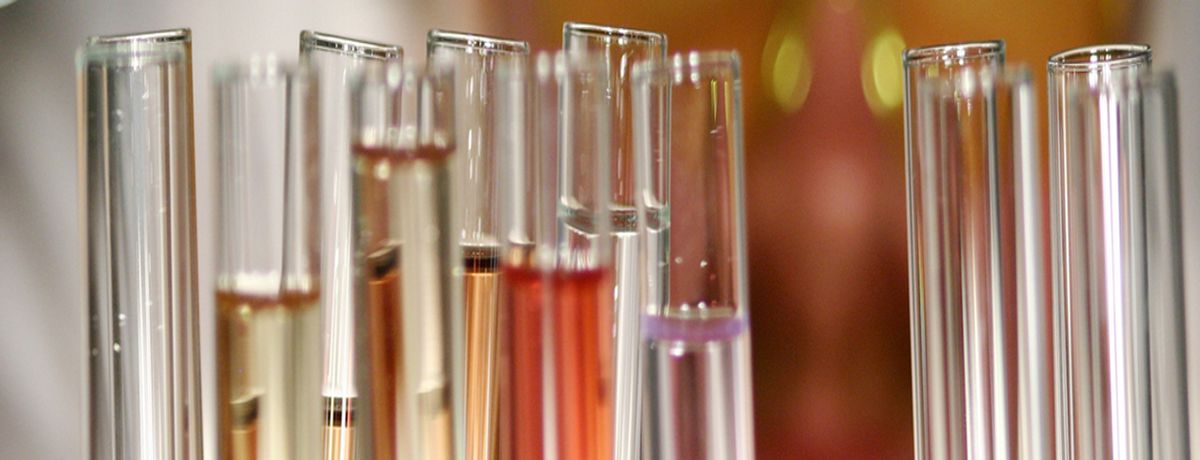The Chemical Biology Graduate Program was created in 2004 with the goal of training students to integrate the principles and experimental techniques drawn from both chemistry and biology.
The Chemical Biology Program is a PhD-granting interdisciplinary program that offers educational and research experience on both the Harvard Medical School and Cambridge campuses, as well as several affiliated institutions such as the Brigham and Women's Hospital, Dana-Farber Cancer Institute, Massachusetts General Hospital, and the Broad Institute
The Chemical Biology Program is one of the programs in the Harvard Integrated Life Sciences, which facilitates collaboration and cross-disciplinary research. For information on our admissions process, please review our Admissions page.
Advising
Incoming students will meet with the class advisors individually at the beginning of each semester to plan their initial program of graduate study. Class advisors will be available to meet with students at any time during their graduate career.
The class advisors will lead a week-long orientation for incoming students at the end of August. The orientation will include a set of lectures and campus tours that will introduce students to the many resources at and around Harvard and will answer their questions regarding research, academics and the graduate program. Students will also be paired with a senior graduate student mentor during the orientation.
After the first year, a student will either choose a single faculty member as their dissertation advisor or initiate a collaboration between two or more labs. Students may choose dissertation advisors from any science department at Harvard, including the research departments of the 11 Harvard-affiliated teaching hospitals.
Curriculum
First-year students meet individually with their class advisors to discuss their background and interests, and together they design a course of study to complement the student's existing training.

Students are required to complete four required science courses. View a list of courses students commonly take.
In addition to these four courses, Chemical biology first-year students enroll in three courses that help prepare them for the practice of science. In addition to the many options within Harvard, students may also register for classes at MIT.
Fall Semester
Chemistry and Chemical Biology 101: The Chemistry and Biology of Therapeutics. This course will cover the chemical and biological principles that govern small molecule therapeutics. We will discuss small molecule conformational analysis, chemical forces that drive small molecule-protein interactions, and small molecule binding to proteins to affect disease states. We will also discuss how protein targets are identified and the frontiers of modern small molecule therapeutics. Protein targets include, but are not limited to kinases, proteases, GTPases, scaffolding proteins, epigenetic modifiers, metabolic enzymes and transcription factors. This course will teach students how to use modern computer modeling applications to perform structure-based design of small molecule ligands
Year Long
ChemBio300: Introduction to Chemical Biology. The course is an evening seminar featuring weekly lectures by program faculty which serves to acquaint first-year students with the major research themes of the program faculty and helps them decide on research rotations and evaluate potential dissertation advisors.
January Term
ChemBio2200: Tools and Methods in Chemical Biology. This course will provide a survey of major topics, technologies, and themes in Chemical Biology, with hands-on exposure to a variety of experimental approaches
Spring Semester: BCMP236 or BCMP250
BCMP 236: Principles of Drug Action in People. This course will discuss principles of drug discovery drug modalities and drug pharmacology. In the first part of the course, fundamental aspects of receptor and enzyme targeting agents, drug mechanism, drug metabolism, pharmacokinetics and pharmacodynamics, small molecules, proteins, and nucleic acid drugs will be described. In the second part of the course, pharmacology of therapeutics that act on the cardiovascular, immunologic, and central nervous systems will be covered. The course will include frontier lectures on antiviral agents, cardiac drugs, and treatments for brain diseases and a journal club on specialized topics in drug discovery. A range of knowledgeable instructors enlisted from the Harvard Medical School faculty and pharmaceutical scientists will participate in teaching this course.
BCMP250: Biophysical and Biochemical Mechanisms of Protein Function. This course focuses on the molecular mechanisms that underlie essential biochemical processes such as signal transduction. Major topics include biochemical thermodynamics and conformational equilibria, protein structure and folding, receptor pharmacology, allostery, and enzymatic mechanisms of signaling. The course includes both content lectures and research frontiers seminars focused on current research in biochemistry with an emphasis on signal transduction in therapeutically relevant pathways.
Second Year
MedSci300: Conduct of Science. The course follows a discussion group format in which 8-12 students meet with a faculty member who leads discussions on the ethical and responsible conduct of research.
Rotations
Students in the program are expected to take 2-4 laboratory rotations before selecting a dissertation project. This is to allow the student to explore different research areas, identify potential collaborators, and experience the environment in different research groups. The program does not set time limits on rotations, but most rotations are expected to be 6-12 weeks long.
Teaching
Students are required to act as teaching fellows in at least one course. We recommend that students complete this requirement by the end of their second year if possible.
Preliminary Qualifying Examination
The PQE aims to assess the student's ability to review research in a particular field, to identify a problem or formulate a central hypothesis that is significant for the field, to design line(s) of experimentation to address the problem or test the hypothesis, and to describe how s/he will interpret the data that would result from the proposed experiment. The topic for the proposal may be related to a student’s dissertation research or the topic may be completely independent.
Students may take the exam in the fall term or in the spring term (by April 15th) of their second year. It is advised that the student completes the teaching requirement in the semester without the PQE.
Dissertation
After completing the PQE, students will be required to meet once a year with a Dissertation Advisory Committee (DAC) consisting of their advisor(s) and three additional faculty. This should help refine the student’s ideas about their dissertation project and define the scope, direction and overall soundness of the idea.
The role of the DAC is to assist the student in defining the dissertation project, review scientific progress, offer critical evaluation, suggest extension or modification of objectives, arbitrate differences of opinion between the student and the advisor if they arise, and decide when the work accomplished constitutes a dissertation. We expect that students will complete their dissertation by their fifth or sixth year of study.

